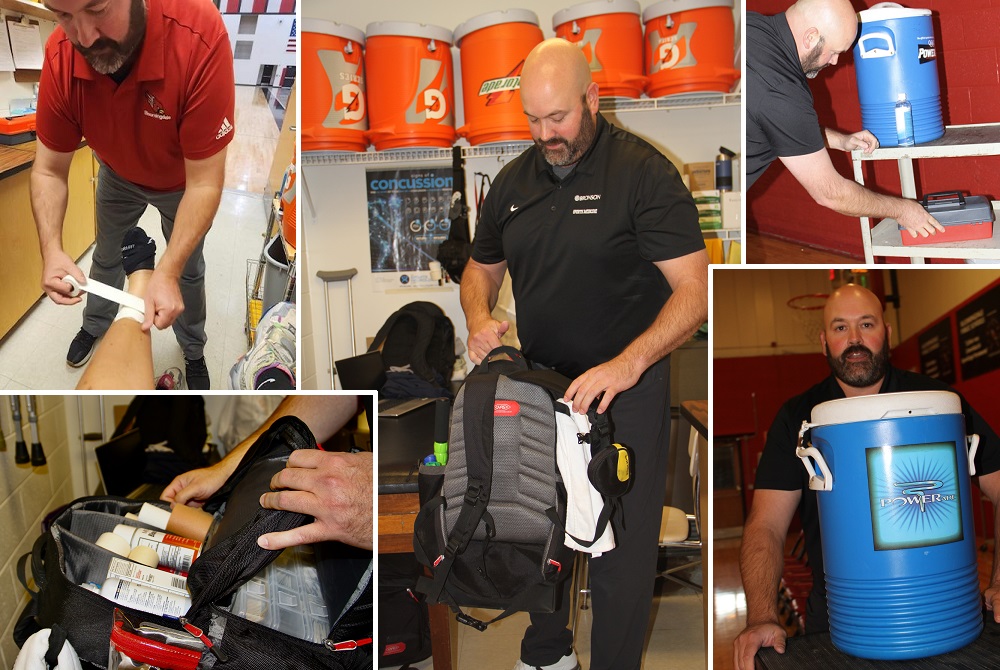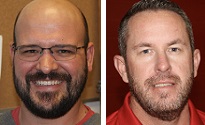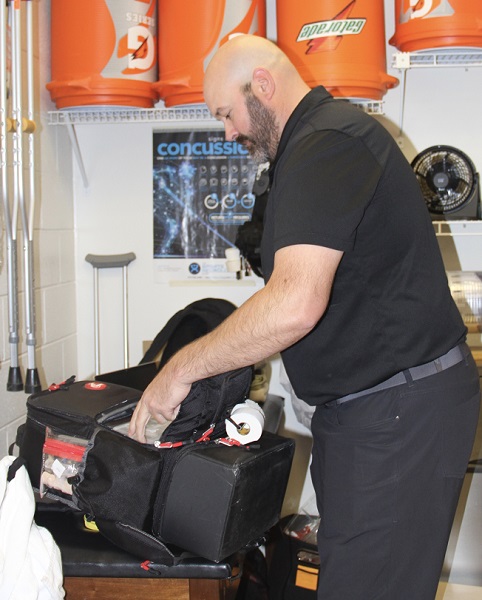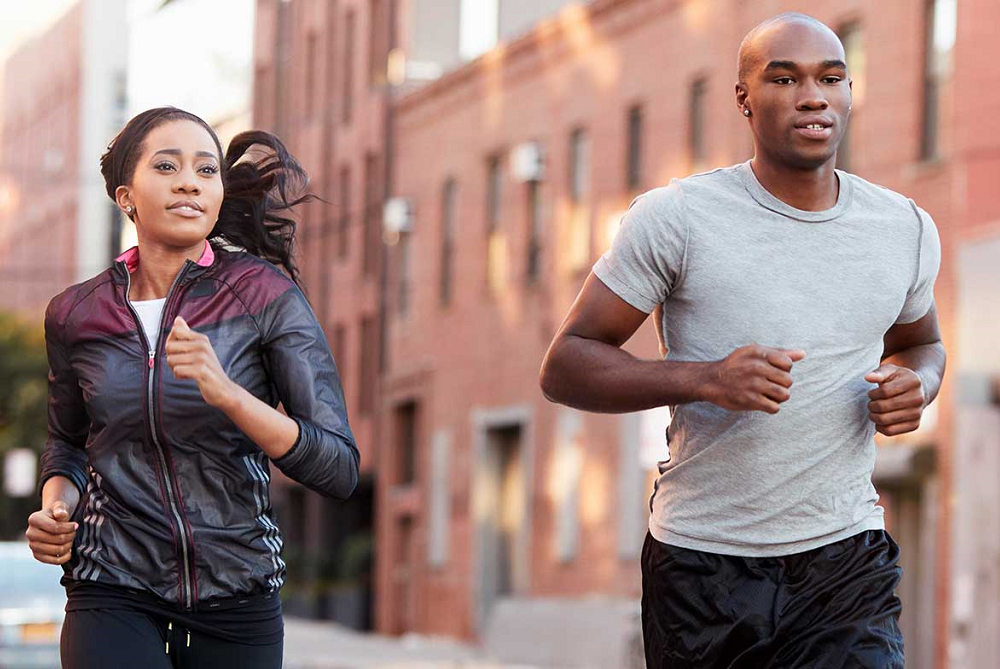
Bloomingdale Trainer Performing Invaluable Role in Keeping Athletes Playing
By
Pam Shebest
Special for MHSAA.com
November 22, 2022
BLOOMINGDALE — If Scott Allison looks bored during one of Bloomingdale’s sporting events, that is a good thing.
 “Trainers like to be behind the scenes and in the shadows,” the certified athletic trainer said. “We’re only needed in emergencies.
“Trainers like to be behind the scenes and in the shadows,” the certified athletic trainer said. “We’re only needed in emergencies.
“It’s one of those jobs that if we’re sitting around looking bored, then things are going well.”
But if an athlete goes down with an injury, Allison is quick to run onto the court or field.
In his first year at Bloomingdale, he has found that working with middle and high school students is a lot different than his previous work with the minor-league hockey Kalamazoo Wings.
Treating the hockey team, with whom he spent much of his 22 years, “There was a lot of traumatic stuff like lacerations or deep contusions, overuse injuries like hip flexors or core injuries or broken bones.
“Everything’s acute and fast. It’s a different animal. In hockey, they’re all pro athletes so they know their bodies really well.”
However, high school and middle school athletes are still in a growing phase.
“These kids don’t really know what’s going on a lot of times, so it’s a lot more education on what’s happening,” Allison said.
“Is it an injury, or is it just soreness? You get a lot of kids that don’t understand the difference between aches and pains or an injury. We see a lot of ankle sprains or shin splints because they’re just developing. They’re in that awkward range where their bodies try to grow too fast.”
 Allison is the Cardinals’ first certified athletic trainer, a new position for which athletic director Jason Hayes campaigned.
Allison is the Cardinals’ first certified athletic trainer, a new position for which athletic director Jason Hayes campaigned.
“What we notice is that if a kid’s injured, they’re out a lot less if you have a trainer because it speeds up recovery time,” said Hayes, who also coaches varsity football and is an assistant wrestling coach. “It’s like having a built-in physical therapist on your staff, too.”
Studies support Hayes’ statements.
According to information from The Sports Institute at University of Washington, “‘The athletic trainers know the athletes,” says Stan Herring, M.D., cofounder of The Sports Institute at (University of Washington) Medicine and a team physician for the Seattle Seahawks and Seattle Mariners. “They see the athletes frequently, if not every day. They know when something is wrong. They are medical professionals who evaluate, treat and rehabilitate athletes.’”
The article continued: “Three recent studies suggest that athletic trainers are linked to significant improvements in the diagnosis of concussion in young athletes and significant reductions in ‘time-loss’ injuries that require athletes to take time away from sports.”
Allison sees himself as a teacher as well as a trainer.
“We see a lot more strains or growth issues,” he said. “A lot of it is maintenance and teaching kids what’s going on with their bodies or what they need to do to change things.”
He also meets with parents and coaches to talk about the best way to prevent injuries.
Allison’s day begins about 1:30 or 2 p.m., giving athletes a chance to talk with him before practices or games.
During the action, he always has his first aid backpack filled with the basics: air splints for fractures or dislocations, AED, EpiPens, and bench kits (with taping and bandaging supplies, splints, gauze, ACE wraps, ice bags, latex gloves and other basic first aid supplies.)
He travels with the teams when they are involved in high-impact sports, such as football, and many times he is also called to treat an opposing player if that team has no trainer.
 Allison is a perfect fit with Bloomingdale, Hayes said.
Allison is a perfect fit with Bloomingdale, Hayes said.
His wife, Kirsten, coached the Cardinals girls basketball team for seven years. His daughter Emma, now at Glen Oaks Community College, graduated from there, and his daughter Bailey is an eighth grader.
“We are a very lucky town,” Hayes said. “We had Doc (Robert) Stevens, who had been volunteering as our athletic trainer for 15 years. He’s just aging out.
“About a year ago, he came to me and said that it was his last year. Scott has 22 years experience, and he has relationships here. To me, it was a no-brainer.”
Assistant varsity football coach Lance Flynn, who also coaches the middle school football team, saw Allison in action during competition in the fall.
“First quarter in a middle school football game, a kid broke his arm,” Flynn said. “My own son, Ryder, was on the varsity team and he sprained his AC socket and Scott took care of him.
“If something happens during a game, they can go see him and I don’t have to worry much because I know they’re in good hands.”
Allison’s affiliation with Bronson Sports Medicine is also a plus, the trainer said.
“With Bronson, we can offer a lot more and expedite getting in to see doctors or specialists if we need to,” he said. “We’re on the same system as the doctors, so we can diagnose and send notes to the doctors and they can send notes back to us.
“If there’s anybody we need to keep track of with the doctors, I can talk with the doctors and figure out how that’s going. If anybody needs to see me, they know I’m here early if they just want to come down to talk.”
Bronson also provides certified athletic trainers at 21 other southwest Michigan high schools: Brooke Vandepolder (Battle Creek Central), Lindsay Aarseth-Lindhorst (Climax-Scotts), Amanda Monsivaes (Comstock), Makenzie Hodgson (Delton Kellogg), Salvador Robles-Soriano (Gobles), Holly Ives (Richland Gull Lake), Katelyn Baker-Contreras (Kalamazoo Hackett Catholic Prep), Lizzy Smith (Kalamazoo Central), Emma Beener (Kalamazoo Christian), Holly Sisson (Kalamazoo Loy Norrix), Nico Talentino (Mattawan), Aaron Eickhoff (Otsego), Quincey Powell (Parchment), Malorie Most (Paw Paw), Jessica Bakhuyzen (Plainwell), Lance LeTourneau (Portage Central), Janelle Currie (Portage Northern), Carrie Calhoun (Schoolcraft), Chelsea Harrison (South Haven), Alexis Walters (Three Rivers) and Natalie McClish (Vicksburg).
 Pam Shebest served as a sportswriter at the Kalamazoo Gazette from 1985-2009 after 11 years part-time with the Gazette while teaching French and English at White Pigeon High School. She can be reached at [email protected] with story ideas for Calhoun, Kalamazoo and Van Buren counties.
Pam Shebest served as a sportswriter at the Kalamazoo Gazette from 1985-2009 after 11 years part-time with the Gazette while teaching French and English at White Pigeon High School. She can be reached at [email protected] with story ideas for Calhoun, Kalamazoo and Van Buren counties.
PHOTOS (Top) Bloomingdale trainer Scott Allison has several tasks as he works to keep the school’s student-athletes healthy and pain-free. (Middle) Bloomingdale athletic director Jason Hayes, left, and assistant varsity football coach Lance Flynn. (Below) Allison packs his bag for another full afternoon. (Ankle-taping photo by Andreya Robinson; all other photos by Pam Shebest.)

How To Enhance Your Running Performance
July 11, 2023
With summer now in full swing, lots of us are hitting the track, the streets and the trails to get and stay fit.
 Whether you run marathons or prefer a quick lap around the block, there are many ways to adjust your running routine to get the most out of your workout.
Whether you run marathons or prefer a quick lap around the block, there are many ways to adjust your running routine to get the most out of your workout.
"It's not uncommon for runners to get into a regular running routine," says Jamie Schwab, an athletic trainer at Henry Ford Health. "They'll find a comfortable pace and stick with it, often even doing the same route."
Unfortunately, doing the same run day after day not only leads to boredom, but it can also prevent you from reaching your full potential.
5 Tips To Run Smarter
It’s no secret that running is tough on the body. In fact, runners frequently develop muscle imbalances that make the body work harder. But you can take steps that can help you improve your run, maximize efficiency and get the most out of your running workout. Here's how:
1. Listen to your body: Whether you're a seasoned runner or just starting out, pay close attention to what your body is telling you. If your hips and knees are sore, back off. Feeling strong? Run another mile. The key to improving your run is to gradually increase distance and intensity over time. At first, you may only be able to handle a 10- or 15-minute jog. But if you keep at it, you'll be running for 30 minutes straight in no time.
2. Get the right footwear: If you're not a competitive runner, you might think any pair of running shoes will do. In reality, properly fitted running shoes not only enhance your performance but also reduce your risk of injury. Find a running store that can analyze your form and recommend shoes based on your unique gait and foot strike.
3. Pay attention to your target heart rate: Your target heart rate is 220 minus your age. Once you hit that rate during your run, you're working at maximum capacity. Don't want to invest in a heart rate monitor or be bothered with another tracking device? You're probably hitting the zone if you can still carry on a conversation during your run.
4. Focus on strength: If you're an avid runner but you aren’t strength training, you're setting yourself up for injury. "You're asking your body to do a lot during a run," Schwab says. "Weak glutes or hips add stress to your knees and ankles." Want to stabilize your run? Pay special attention to your core muscles. Solid strength training exercises include lunges, planks, squats and pushups.
5. Keep it interesting: Doing the same running routine day after day can be exhausting. Break out of your comfort zone by trying a different route, playing with your pacing, or running stairs or hills. You might even incorporate plyometric activities into your run. These explosive motions — hopping, skipping and jumping — help build power, strength and performance.
Running Safe
Eating well and getting regular exercise are key to enhancing overall health. Plus, a fit body is better equipped to avoid and battle infection. Running can also protect your sanity.
"Running is a great escape for many exercise enthusiasts," Schwab says. "Many people find they not only feel physically healthier, but their mental and emotional health also gets a boost."
The caveat: When you're running, you're placing double or triple your body weight on one side of your body at a time. So it's critical to pay attention to what shape your body is in before you take to the track. A few questions to ask yourself:
- Am I in good cardiovascular shape?
- Am I recovering from shin splints, knee injuries or hip problems?
- Am I at risk of falls?
- Am I suffering from osteoporosis?
It’s always important to check with your doctor before making changes in your exercise regimen. If running isn't appropriate for you, plenty of other activities, such as swimming, hiking and biking, can get your heart pumping.
To find a sports medicine specialist at Henry Ford, visit henryford.com/sports or call 1-800-436-7936.
Jamie Schwab, AT, ATC, SCAT, CSCS, is an athletic trainer with Henry Ford Sports Medicine and works with student athletes at Edsel Ford High School. She is a National Strength and Conditioning Association certified strength and conditioning specialist.

